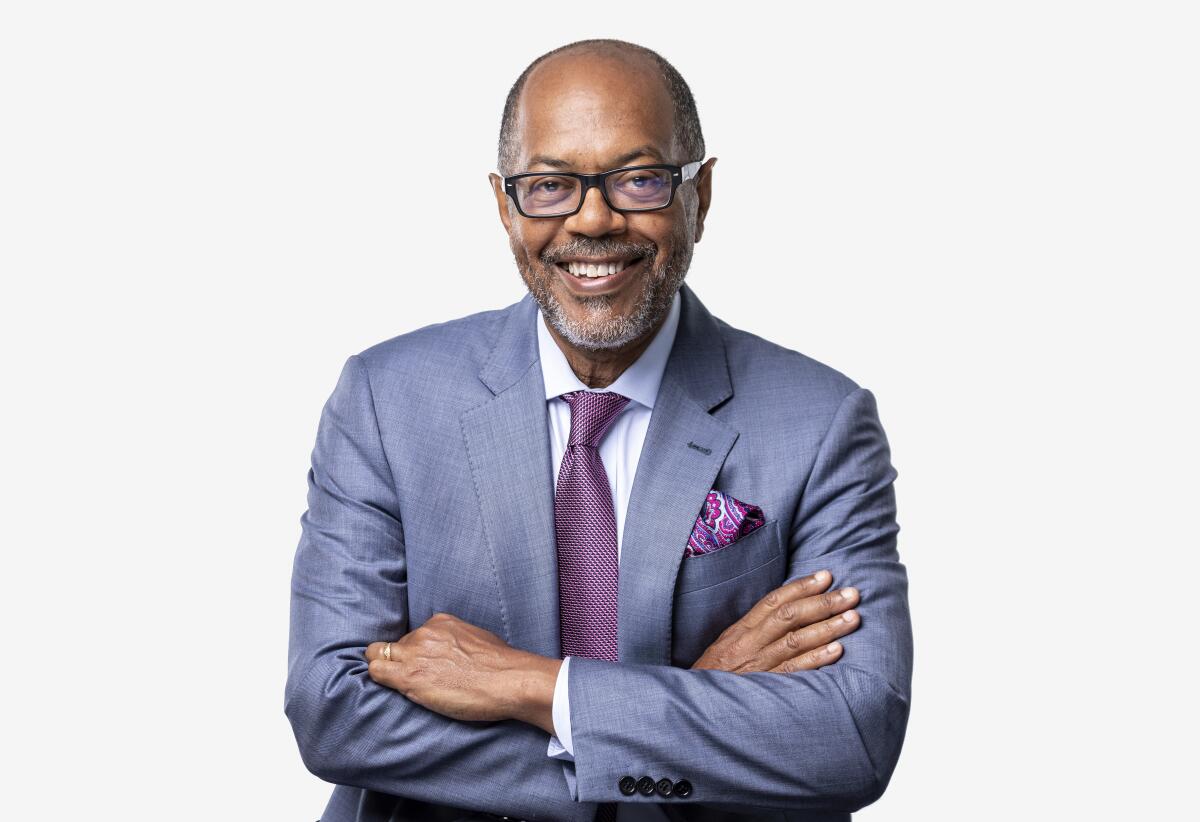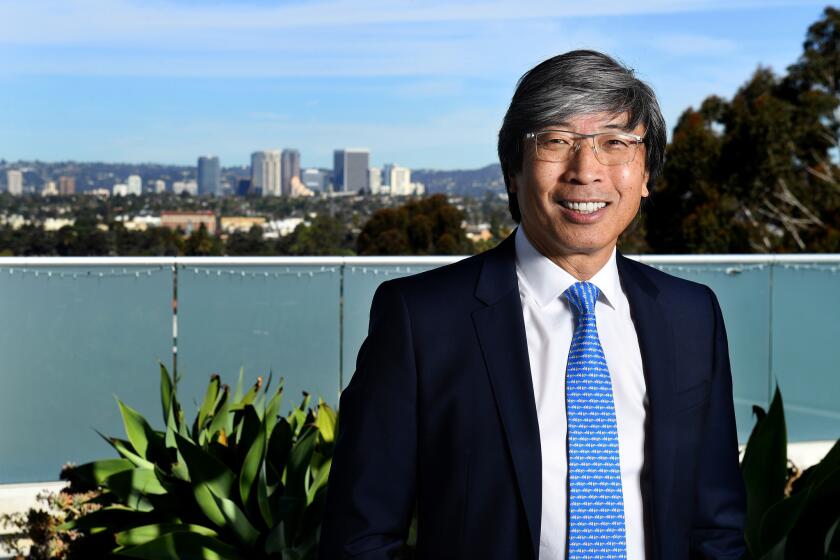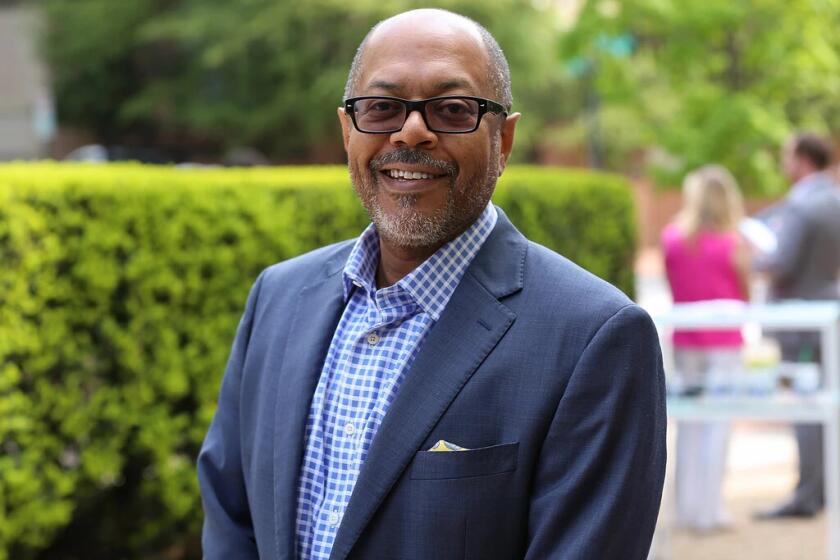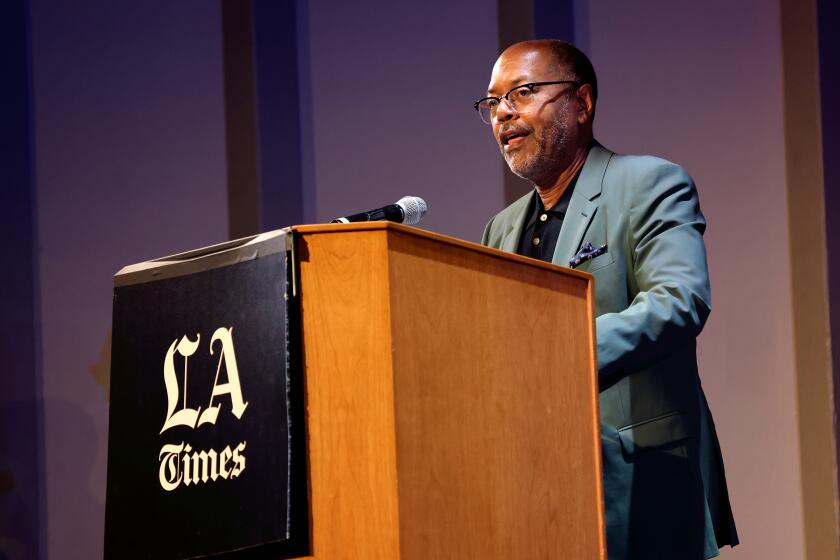L.A. Times Executive Editor Kevin Merida to step down

- Share via
Los Angeles Times Executive Editor Kevin Merida announced Tuesday that he was stepping down 2½ years after joining The Times as its newsroom leader with a mission to strengthen the organization during a period of turbulence in the news industry.
Merida’s exit, effective Friday, presents another challenge to a newsroom already under strain as well as to the paper’s owner, Dr. Patrick Soon-Shiong, who now must find a new top editor.
The Times has fallen well short of its digital subscriber goals and needs a revenue boost to sustain the operation.
“Today, with a heavy heart, I announce that I am leaving The Times,” Merida wrote in a note to the staff. “I made the decision, in consultation with Patrick, after considerable soul-searching about my career at this stage and how I can best be of value to the profession I love.”
Soon-Shiong said that he and Merida had “mutually agreed that his role as executive editor of the L.A. Times will conclude this week.” Merida’s contract was due to expire at the end of May.
Soon-Shiong said that he and his family were immediately launching an internal and external search for Merida’s successor.
“In the near term, the newsroom’s senior leadership team, Julia Turner, Sara Yasin, Scott Kraft and Shani Hilton, will be overseeing the newsroom, with Terry Tang continuing to lead Opinion,” Soon-Shiong said in a note.
Soon-Shiong and his family acquired The Times and the San Diego Union-Tribune for $500 million nearly six years ago from Tribune Co., restoring Los Angeles’ 142-year-old institution to local ownership after more than a decade of turmoil and endless waves of cost-cutting that prompted an exodus of talented journalists and a withering of ambition.
His stewardship has faced setbacks brought by the COVID-19 pandemic, a rapidly shifting news environment and financial headwinds that have stymied his goal to make the organization self-supporting. Last summer, the family sold the San Diego paper to an affiliate of Denver-based MediaNews Group, which is owned by controversial New York investment firm Alden Global Capital.
On Tuesday, Soon-Shiong reaffirmed his ties to L.A.’s storied news organization.
He said he and his family are not interested in selling The Times.
“We are 1000% committed to the paper,” he said in an interview. “It’s a family obligation of immigrants coming to this country, and being blessed by the democracy of America.”
Tensions between Soon-Shiong and Merida had developed in recent months, including over the paper’s financial underperformance, its failure to meet subscriber growth targets and the amount of time and investment needed to complete a turnaround without continued cash infusions from the Soon-Shiong family, according to several knowledgeable people who were not authorized to speak publicly.
In the interview, Soon-Shiong acknowledged the rift.
“We mutually agreed that he perhaps was not the right fit,” Soon-Shiong said. “It is time for us to have a fresh look at the organization ... [and] for a new generation of leadership.”
The paper’s owner said that he plans to become more involved in the operations and will meet Wednesday with top editors to begin the process of selecting an interim editor. “I can’t promise that we won’t have additional cost-cutting,” Soon-Shiong said.
For his part, Merida said: “I came to my decision based on a number of factors, including differences of opinion about the role of an executive editor, how journalism should be practiced and strategy going forward. I wish Patrick well in finding the right editor for him.”
Merida, who turns 67 this month, arrived in June 2021 after leading an award-winning ESPN news unit that plumbed the intersection of race, culture and sports. He was chairman of ESPN’s Editorial Board.
Times staff members were thrilled by his arrival, hoping the respected newsman would restore the organization to national greatness.
He had spent three decades in traditional newsrooms, including 22 years at the Washington Post, where he rose to managing editor in charge of news, features and the universal news desk. He was deeply involved in the Post’s online push that led to sustained subscriber growth, gaining insights that Soon-Shiong and journalists hoped would translate into success at The Times.
Merida reorganized the newsroom and created a successful Fast Break team of nearly three dozen journalists to quickly pounce on stories in order to give its digital editions a greater sense of urgency and scope. The Times in 2023 produced three of the nation’s Top 10 news stories, in terms of engagement, according to the technology firm Chartbeat.
He bolstered news and enterprise coverage in science, environment, entertainment and accountability journalism. He experimented with storytelling innovations to nudge the paper beyond its print roots, including forming a team of social media journalists, called the 404 by LA Times, and De Los, an online news vertical providing news and commentary to engage Latinos “through a shared sense of culture and identity.”
He also pushed for greater diversity throughout the newsroom and promoted prominent Latino journalists to key leadership roles.
During his tenure, The Times won three Pulitzer Prizes, including last year for breaking news reporting for its coverage of a leaked audio recording that exposed L.A. City Council members making racist comments and plotting to consolidate power during the redistricting process.
Merida, head of ESPN’s the Undefeated, has rare experience in print journalism, television and running a digital startup.
Merida’s departure comes after a rocky year and a devastating round of layoffs last summer that saw the newsroom shrink by 13%. On the business side, the Los Angeles Times Studios — once seen by Merida as a key area of growth — was significantly scaled back. Merida championed a partnership with Walt Disney Co.’s ABC News Studios, which has resulted in documentary film co-productions to extend The Times’ journalism to new audiences.
The Times has nearly 550,000 digital subscribers, including through direct sales and third-party partnerships, such as Apple News+.
But the publication is struggling amid a rapid industry-wide decline in print readers and failing upstart digital-only news organizations, including BuzzFeed News.
The Times missed its revenue projections last year after Hollywood strikes curtailed ad spending by the major film and TV studios. The paper cut back sports listings, scores, standings and game coverage, angering thousands of longtime subscribers.
Additionally, the newsroom union has grown more restive after going more than a year without a contract.
Coverage of Israel’s war on Hamas created internal tensions, particularly after about three dozen staff members signed an open letter decrying the deaths of Palestinian journalists and Israel’s actions. Merida swiftly removed those journalists from all coverage of issues that were directly or indirectly related to the Middle East conflict for at least three months.
He reminded staff members that the paper’s ethics policy forbids the promotion of political causes.
“I am deeply proud of our coverage, which has been thoughtful, courageous and wide-ranging, and believe The Times has risen to this challenging occasion,” Merida wrote in early November. “Rigor, fairness, dissent, difference can all co-exist as qualities that lead to the best journalism. But we must maintain the integrity of that journalism, which is core to our reputation. Journalism itself is an agent for change.”
Soon-Shiong said that Merida’s decision to temporarily remove staffers who signed the letter from being involved in coverage of the Middle East was not a factor in the editor’s departure.
But he said he was “disappointed” that Merida had not informed him before making the decision. He cited other factors for Merida’s abrupt exit, including a lack of progress toward meeting readership goals.
Merida told more than 550 Times employees that the paper was facing a budget hole of “tens of millions of dollars.” Angry staff members protested cuts to the newsroom.
This year will bring other major moves, including additional cost pressures and a shift of the printing operations to a plant owned by rival Southern California News Group in Riverside County rather than using The Times’ longtime facilities on Olympic Boulevard in downtown L.A.
“I am proud of what we accomplished together during my tenure here, and grateful to Patrick and the Soon-Shiong family for the opportunity to help transform The Times into a modern, innovative news media company for a new generation of consumers,” Merida wrote. ”We’ve made tremendous progress toward that goal, and I am hopeful that progress will continue.
“I am happy that I came to L.A. for this exciting challenge during the Covid summer of 2021, and have no regrets,” Merida said. “I still believe in The Times and its potential.”
Merida said leading The Times’ newsroom was “one of the signature experiences” of his career.
“Ours is a fierce, resilient, superbly talented newsroom, and I am proud to have belonged to it.”
In his note, Soon-Shiong sounded an upbeat note that the organization still has runway to succeed.
“I am proud of the LA Times’ journalistic integrity, ability to break news rapidly and strong investigative reporting,” Soon-Shiong wrote. “A vibrant future for the LA Times, where this organization is self-sustaining and capable of growth, requires new approaches to better engage with our readers and grow new audiences.”
More to Read
Inside the business of entertainment
The Wide Shot brings you news, analysis and insights on everything from streaming wars to production — and what it all means for the future.
You may occasionally receive promotional content from the Los Angeles Times.














